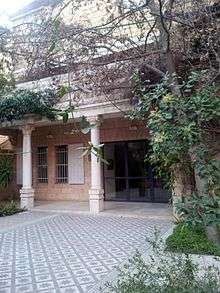Jerusalem Institute for Policy Research
Jerusalem Institute for Policy Research (JIPR), formerly the Jerusalem Institute for Israel Studies, is an independent policy think tank located in Jerusalem, Israel. The institute conducts policy studies on Jerusalem, innovation policy (R&D), environmental policy and the management of the Israeli–Palestinian conflict. The institute's studies and recommendations serve as resources for governmental bodies, public institutions, civil organizations and the public.
 | |
| Founded | 1978 |
|---|---|
| Type | 501(c)(3) |
| Location | |
| Method | Policy research |
Key people | Lior Schillat (Director) |
| Website | JIPR website |
History
The Jerusalem Institute was founded in 1978 by Mayor of Jerusalem Teddy Kollek, in collaboration with the Jerusalem Foundation and the Hebrew University of Jerusalem. The first directors of the institute were David Amiran and Ora Ahimeir. Founding members included Avraham Harman, Haim Kobersky, Joshua Prawer and Baruch Yekutieli.[1] Lior Schillat is the institute's general director. Yaacov Bar-Siman-Tov was president of the institute since 2009 until his death in 2013.
Activities
The JIPR is an independent, apolitical research institute. Its mission is to contribute to decision-making, policy and planning processes and to influence their outcomes in Jerusalem and in Israel. To this end, it produces accurate, thorough and data-based information, conducts interdisciplinary policy-oriented research and provides innovative policy recommendations and planning proposals for the benefit of decision makers, the third sector and, ultimately, the public.
Since its founding, JIPR has issued over 400 publications, which contribute to the professional and public discourse pertaining to Jerusalem in particular and Israeli society in general. It publishes some 20 books and reports annually, including the Annual Statistical Yearbook of Jerusalem edited by Maya Choshen. The institute holds conferences and public events, most of them open to the public. The institute hosts visitors and delegations and guides field tours.
The "Peace Process in Jerusalem" (JIIS, 2000) served as a working paper at the 2000 Camp David Summit in July 2000 for the Israeli delegation.[2]
Other achievements include:
A Regional Master Plan for the Jerusalem Region (TAMAM 1/30), spearheaded by JIPR researchers, which is pending statutory status, a JIIS-initiated biotechnology hothouse and industrial park, established in Jerusalem and a JIIS research study that showed a direct link between cultural activities and urban renewal and led to the creation of rich artistic summer festivals in Jerusalem known as "The Jerusalem Season of Culture".
JIPR Research clusters
Jerusalem
Jerusalem, and the many challenges it poses, command the lion's share of JIPR activities. This research cluster produces policy recommendations and influences policymakers about the necessary steps for promoting the development, prosperity and strength of Jerusalem, for all its inhabitants.
Areas of Research:
- Jerusalem's varied communities and interactions between them
- The city's economy
- Quality of life
- Metropolitan Jerusalem
- Urban and regional planning
Conflict Management and Resolution
The Conflict Management and Resolution research cluster develops new conceptual models and practicable alternatives for the management and resolution of the Israeli-Palestinian conflict, particularly in Jerusalem, for the use of decision-makers.
Areas of Research:
- Possible geopolitical options in Jerusalem, with special attention given to holy sites
- Proposing a conceptual framework for Jewish-Arab relations
- Outlining strategies for managing the conflict and potential future scenarios
Environmental Policy
Our Environmental Policy Research Center enhances public management of environmental matters by influencing decision-making processes; expanding and enhancing the data used for designing environmentally friendly policies; and evaluating the effectiveness of public-service intervention tools.
Areas of Research:
- Devising sustainability indicators and conceptualizing future scenarios
- Forecasting Israel's spatial challenges towards 2030
- Environmental diplomacy
- Environmental governance
- Environmental economics
- Managing environmental risks
Economics Unit
The Economics Unit provides the research clusters with an economic perspective and identifies additional potential points for research and development, particularly pertaining to Jerusalem.
Areas of Research:
- Jerusalem's economy: Examining Jerusalem's labor market, analyzing the tourism sector, promoting entrepreneurship in local industry, identifying engines of growth
- Analyzing R&D policies for the promotion of industrial innovation in Israel